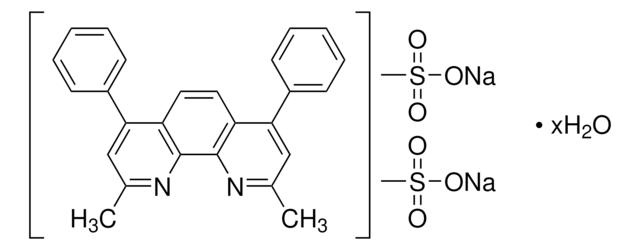121908
Neocuproine hydrate
99%
Synonym(s):
2,9-Dimethyl-1,10-phenanthroline hydrate
About This Item
Recommended Products
Quality Level
Assay
99%
solubility
methanol: soluble 50 mg/mL, clear, colorless to dark yellow
SMILES string
[H]O[H].Cc1ccc2ccc3ccc(C)nc3c2n1
InChI
1S/C14H12N2.H2O/c1-9-3-5-11-7-8-12-6-4-10(2)16-14(12)13(11)15-9;/h3-8H,1-2H3;1H2
InChI key
MFZBSWSCIWCRKS-UHFFFAOYSA-N
General description
Application
Signal Word
Warning
Hazard Statements
Precautionary Statements
Hazard Classifications
Eye Irrit. 2 - Skin Irrit. 2 - STOT SE 3
Target Organs
Respiratory system
Storage Class Code
11 - Combustible Solids
WGK
WGK 3
Personal Protective Equipment
Certificates of Analysis (COA)
Search for Certificates of Analysis (COA) by entering the products Lot/Batch Number. Lot and Batch Numbers can be found on a product’s label following the words ‘Lot’ or ‘Batch’.
Already Own This Product?
Find documentation for the products that you have recently purchased in the Document Library.
Customers Also Viewed
Our team of scientists has experience in all areas of research including Life Science, Material Science, Chemical Synthesis, Chromatography, Analytical and many others.
Contact Technical Service












